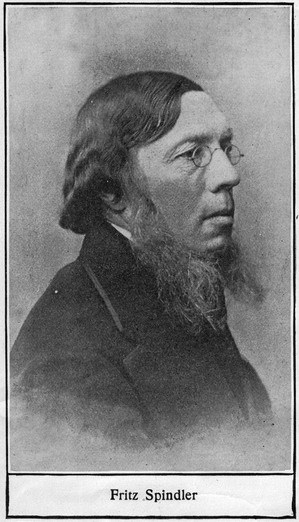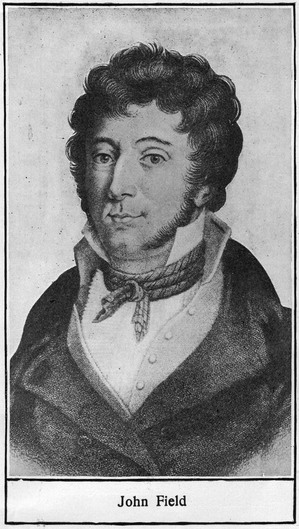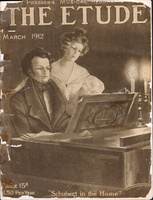Spindler was born at Wurzbach, Lobenstein, November 24, 1817, and died at Niederlössnitz, near Dresden, December 26, 1905. He was originally intended for the ministry, and studied theology with that in mind, but eventually gave it up in favor of music. He studied piano-playing with F. Schneider, of Dessau, and devoted himself to a life of teaching and composing. He settled in Dresden in 1841, and seems to have found his surroundings congenial, as he remained there for the rest of his life. As a writer he was very prolific, and published considerably over three hundred compositions, most of which are in the nature of teaching pieces. Many of these have proved exceedingly popular, and among the most widely known may be mentioned Bubbling Spring, The Butterfly, Charge of the Hussars, Convent Bells, Soldiers Advancing, Rippling Waves, Spinning Wheel and Woodland Rivulet. He also made some very excellent transcriptions of operas, and other works, which are of medium grade and very popular. Spindler did not confine himself solely to writing music of the simpler kind, however, but produced trios, sonatas, two symphonies, a concerto for pianoforte and orchestra and other works in larger forms. While not, perhaps, a musician of transcendant ability, Spindler was a musician of a type which has done much to establish the German reputation for thoroughness in musical art. His compositions are for the most part tuneful in character, well constructed, and well adapted to the purpose for which they are intended.
Field was born at Dublin July 26, 1782, and died at Moscow January 11, 1837. He came of a musical family, and was made to practice hard in childhood. His father apprenticed him to Clementi for one hundred guineas, and Field made himself useful as a piano salesman in Clementi’s shop besides being a pupil of the great master. He made his London début in 1794. When Clementi went to Russia by way of Paris and Germany he took Field with him, and Field attracted considerable attention, Spohr, especially, being much impressed with his ability. Clementi returned to England in 1804, but Field remained in St. Petersburg and achieved remarkable success as a pianist and teacher. He also had great success in Moscow in 1823, and after further traveling in Russia returned to London in 1832. A year later he went through Paris, Belgium and Switzerland to Italy. He failed to please and became sick and destitute in Naples. A Russian family took him back to Moscow, but it was too late, and his own intemperance was largely responsible for his early death. His piano concertos and other pieces created much interest in his day, but Field is chiefly remembered by his nocturnes. He wrote twenty of them, and many of them are very charming. The best, perhaps, is the one in E flat. It was left to Chopin, however, to realize the full possibilities of the nocturne. Field was a remarkable pianist, possessing a “smooth and equable touch” and a perfect legato.
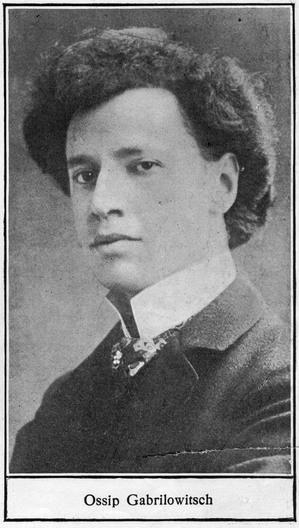 OSSIP GABRILOWITSCH.
OSSIP GABRILOWITSCH.
(Gah-bre-lo’-vitsch)
Gabrilowitsch was born in St. Petersburg February 8, 1878. His father was a lawyer in the city, but his brothers were very musical, and one of them was his first teacher. Anton Rubinstein was much impressed with his playing, and he was entered in the St. Petersburg Conservatory, which was then directed by Rubinstein. He was a pupil of Victor Tolstoff, but had many personal conferences with Rubinstein. From St. Petersburg he went to Vienna, where he was a pupil of Leschetizky for two years. He has been very successful as a concert pianist, especially in America. He has visited this country in 1900, 1901, 1902, 1903 and every year since 1906. In 1909 he married Clara Clemens, the daughter of Samuel Clemens—“Mark Twain”—whom he met while a student in Vienna. As a composer Gabrilowitsch has not produced many works in the larger forms; he has, however, written several pieces for the piano. His playing is remarkable for its beautiful tonal effects. He possesses an excellent sense of rhythmic values, and this makes his phrasing delightful to listen to. He is one of the distinguished coterie of Leschetizky pupils whose acknowledged leader is Paderewski. This group of pianists includes Bloomfield-Zeisler, Essipoff, Goodson, Hambourg and Slivinski.
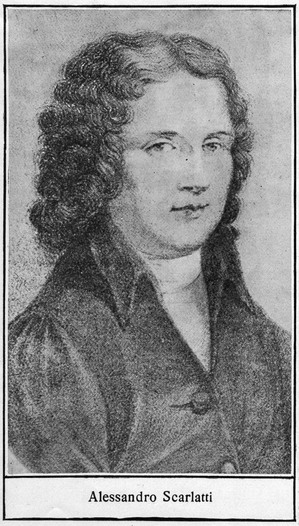 ALESSANDRO SCARLATTI.
ALESSANDRO SCARLATTI.
(Scar-lah’-te.)
Scarlatti was born in Sicily, 1659, or possibly 1658, and died in Naples, Oct. 24, 1725. Little is known of his early training, but his first opera, produced in Rome, 1679, won him the favor of Christina, Queen of Sweden. In 1684 he was appointed Maestro di Capella to the Viceroy in Naples, and produced many operas and much chamber music. He was married, and his son Domenico was born during this period. He went to Florence in 1702, where he composed operas for Ferdinand III. As there was no permanent post for him there he went to Rome, where he attained a high reputation. He was at his old post in Naples at an increase of salary, however, in 1713, and at this time he attained the height of his fame. His popularity waned about 1719, and he revisited Rome. After three or four years, he came back to Naples, and remained in comparative obscurity until his death. Scarlatti greatly augmented the scope of the orchestra in opera, introduced new harmonic effects, and gave greater variety to recitative, besides establishing the form of the operatic “aria.” He was the first of the operatic innovators, and as such takes his place with Gluck, Weber, Wagner, and more modern composers.
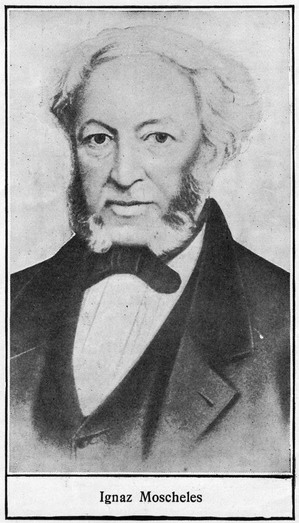 IGNAZ MOSCHELES.
IGNAZ MOSCHELES.
(Mos’-shel-lez)
Moscheles was born in Prague, May 30, 1794, and died at Leipzig March 10, 1870. He studied piano with Dionys Weber, and at fourteen played a concerto of his own in public. On the death of his father he went to Vienna, where he studied counterpoint with Albrechtsberger and composition with Salieri. He also enjoyed the friendship of Beethoven. In 1815 he commenced the tour of Europe, and for a decade was known as a virtuoso pianist. It was during this period that he commenced his intimate friendship with Mendelssohn, who studied piano with him. Moscheles was a great favorite in England, and shortly after his marriage, in 1826, he went to live in London, where for ten years he was busy as a teacher, conductor and composer. When Mendelssohn started the Leipzig Conservatory, in 1848, Moscheles became leading piano instructor. He remained until his death, doing work of incalculable value as teacher and adviser of innumerable students. Much of the solid reputation that Leipzig possessed was due to the splendid work of Moscheles. He composed much in the classical style, and his concertos and studies have a permanent place in the musical world. As a pianist he was renowned for his “crisp and incisive touch, clear and precise phrasing and a pronounced preference for minute accentuation.” His diary and the testimony of his pupils show him to have been a kindly, genial man, much beloved by all who knew him.
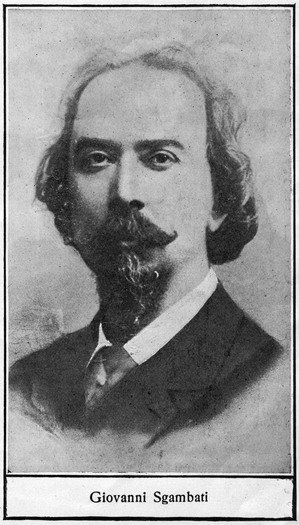 GIOVANNI SGAMBATI
GIOVANNI SGAMBATI
(Sgahm-bah’-te)
Sgambati was born in Rome, May 28, 1848. His father was an Italian lawyer, and his mother the daughter of an English sculptor. He was intended for the legal profession, but rejected it in favor of music. Barberi was his first teacher, and after the death of his father, in 1849, he removed to Trevi, where he became a pupil of Natalucci, a graduate of the Naples conservatory. Sgambati removed to Rome in 1860, and soon established himself as a pianist and conductor and composer of marked ability. He introduced many famous works of Beethoven, Schumann, Chopin and other noted composers which were unknown to Roman audiences. Liszt was impressed with his ability, and in 1876 Wagner was present at a concert where some of Sgambati’s compositions were given. Wagner was much interested in them, and was instrumental in having two quintets and other works published in Germany. Sgambati has played and conducted in London, Paris and other important music centers, where he is much appreciated. His compositions include some excellent chamber music, a concerto for piano and orchestra, a symphony and other orchestral music. He has also written songs and shorter piano pieces, including the popular Gavotte in A flat minor and the Vecchio Minuette. Sgambati has won many distinctions at home and abroad, and has exerted marked influence on Italian music.


